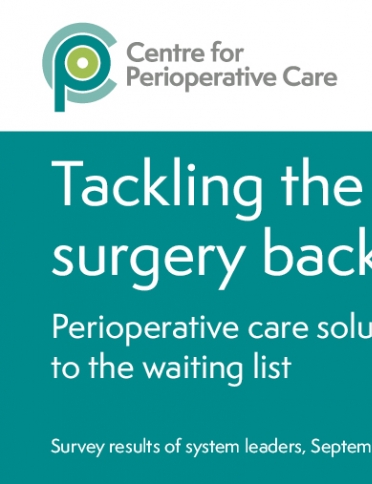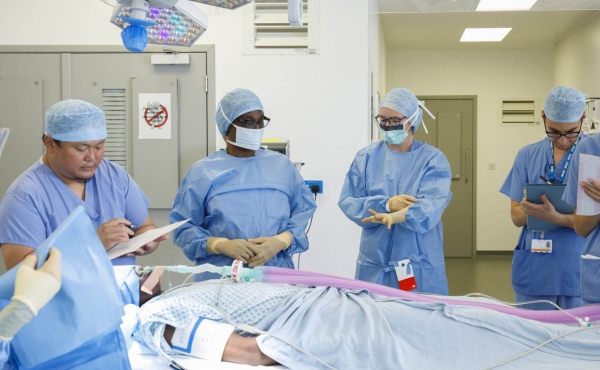CPOC releases new poll on how perioperative care can help reduce the waiting list
Increasing day surgery critical to reducing backlog say NHS leaders
Call for overhaul of how patients prepare and recover from operations
Over half (54%) of NHS leaders think increasing day surgery is the best way to reduce the planned operation backlog, according to a new survey conducted by Savanta ComRes on behalf of the Centre for Perioperative Care (CPOC). With 80% saying it was likely to take over two years to see any reductions in waiting lists.
The Centre, a partnership between nine health organisations including the Royal Colleges of Anaesthetists, Surgeons of England, Physicians, GPs, and Nursing, collected the data as part of a report into perioperative solutions to the backlog. This evidence strengthens the calls for day case surgery to become the default option for more than 200 procedures including gall bladder, many fractures, hernia and most breast surgery.
Increasing day surgery could see the number of elective patients requiring an overnight stay in hospital cut by 50%1, freeing up inpatient beds and helping to tackle the significant elective surgery waiting lists and discharge challenges.
The survey includes respondents working across the UK, in high level leadership positions, including in hospital trusts, healthcare boards, primary care networks, local authorities and NHSEI. Findings also showed nearly four in five (77%) believe investing in and improving the journey of patients from prehabilitation to rehabilitation, known as perioperative care, will go a long way to managing waiting lists. With evidence showing that preparing for surgery reduces complications by 30 – 80% and reduces length of stay for more complex operations by 1-2 days.2
Only 16% of leaders say that their local health system provides high quality perioperative care across the whole surgical pathway and even fewer (10%) say that their local health system provides efficient perioperative care. So, the room for improved efficiency and reduced duplication is massive.
Interventions health and care leaders say would be most effective in reducing the backlog:
- 54% want to see an increased number of routine operations performed as day cases
- 49% want to implement patient-centred initiatives to reduce time spent in hospital
- 42% are asking for the promotion of effective shared decision-making, making sure patients understand the options and have true choice and preparation.
While leaders have identified which interventions will most help them reduce their backlog, the survey showed that current funding levels are woefully inadequate, with 91% saying they do not have the funding to provide quality perioperative care in their local health system.
To beat the backlog CPOC is calling on the forthcoming government elective delivery plan to fund proposals which would see the development of truly joined-up, patient-focused perioperative care. This would include investment in day surgery, the funding of exercise and nutrition services for patients on the waiting lists and enhanced care facilities for quicker recovery.
Dr David Selwyn, Director of the Centre for Perioperative Care said:
“We know the pandemic has had a significant impact on elective surgery, one in 10 people in England are now on a waiting list to have an operation3 and returning to business as usual will only see the backlog increase. While the funding announced for service recovery in the NHS health and social care plan was welcome, the government must grasp this opportunity to not only look at when care is delivered but how.
“NHS leaders have put their cards on the table, they want to see truly joined-up, cost-effective, efficient, and patient centered care. Increasing the use of day surgery not only improves the patient treatment and satisfaction but frees up hospital capacity. Every opportunity to cut overnight hospital stays for lower risk operations will be a significant step forward in the fight to beat the backlog.
“However, reducing the time a patient spends in hospital, is not something that can be implemented through one change and one organisation. The whole system, from community care to NHS trusts, need to work together to deliver for patients from pre-hab to re-hab. Whether this be ultilising waiting lists by encouraging patients to prepare for their operation or taking the time to speak through the best treatment options available.
“The government needs to sit up and listen to what NHS leaders are telling them. Investment in the way care is delivered rather than purely trying to do more surgery faster, will bring positive financial benefits to the health service, free up NHS surgery capacity, help reduce the backlog and most importantly improve outcomes for patients.”
Lawrence Mudford, Patient Representative Centre for Perioperative Care said:
“Comprehensive perioperative care has been proven to provide a safe and effective model to enhance the quality of care for patients. These findings, from NHS leaders no less, give additional weight to the recognised need for the extension of a safe and effective day surgery service, resulting in improved benefits in outcomes for patients.
“The government must be bold and align these two ideals - perioperative care and day surgery - as a positive way to beat the backlog. With so many patients currently waiting extended times for surgery, often in pain, only a comprehensive alignment of all parts of the healthcare system, working together and not in silos, will make the necessary impact.”
Notes
Savanta ComRes interviewed 79 system leaders in the UK online, between 9 June and 30 July 2021.
Respondents are based across a range of settings, with the most common being PCNs (42%), HWBs (37%), local authorities or councils (35%), NHS Acute / Hospital Trusts (33%), CCGs (30%), and STPs or ICSs (29%). These tend to be board members (29%), clinical leads or consultants (25%), or local/regional directors and deputy directors (20%).
REFERENCE:
- GIRFT, CPOC, and BADS (2020) National Day Surgery Delivery Pack, National-Day-Surgery-Delivery-Pack_Sept2020_final.pdf (gettingitrightfirsttime.co.uk)
- Impact of perioperative care on healthcare resource use: Rapid research review – June 2020
- Consultant-led Referral to Treatment Waiting Times – released 9 September 2021
Download the full report
Tackling the elective surgery backlog- Perioperative care solutions to the waiting list





